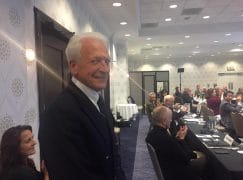World’s best competition director?
mainRichard Rodzinski was given a lifetime achievement award today by the World Federation of International Music Competitions, a body not altogether above suspicion.
Richard, however, is.
He built up the Van Cliburn competition over 24 years int an international powerhouse and then transformed Moscow’s Tchaikovsky Competition into a model of transparency.
His first prize is well deserved.






Interesting that the World Federation of International Music Competitions awards prizes to its members – but that’s to be expected of an organization that deludes itself about the “success” of their mission. What this organization has in fact accomplished is to isolate young talents into practice rooms for hours on end so that they can homogenize their performances of standard repertoire to appeal to mediocre jury-members so that they can win a prize, while in the meantime their musicianship stagnates. And, after age 30, when they can no longer enter competitions, they discover that there are no concerts for half-baked musicians with a stack of competition trophies. As for Mr. Rodzinski, there’s no question that he’s a good event-organizer, but can anybody remember the winners of the 1989, 1993, 1997, 2001, 2005, or 2009 Cliburn competitions that he organized? For that matter, did the Cliburn competition ever succeed in launching a major, world-class talent? For the most part, it can be noted that the Cliburn machine propelled some highly-skilled students into an orbit that ultimately destroyed them. Perhaps the World Federation would reconsider its mission: Do they exist just to put on these extravagant events to give skilled students their 5 minutes of fame, or might they re-channel their efforts into supporting young talents beyond the event, to develop them into serious, productive musicians? Think back to the 1989 Cliburn, when the prize went to the young & hopelessly immature whiz-bang Alexei Sultanov. Indeed, he was the least dull of the 6 finalists, but instead of locking him up in a conservatory with a good teacher, the Cliburn Competition led that poor kid to his slaughter by hurling him onto the circuit, where he burned out after 4 years. So, he went to Warsaw in 1995, where the jury had the good sense NOT to give him the 1st prize – he got 2nd prize for playing no better than he had at the Cliburn 6 years earlier, and then he sank yet again. But Sultanov is just one of MANY such talents who fell victim to the World Federation of International Music Competitions. The competition system doesn’t create artists – it fosters warriors, and such warriors don’t survive on the concert circuit — so what’s the point of these shams?
Dear Steinway Fanatic,
Thank you for your unequivocal comment on this subject. If I were you, I would go further – a lot further.
I completely agree wth your analysis of the toxic after-life of competitions winners, who themselves gave up a great deal of musical integrity in submitting to the utter fakery of the competition circuit in the first place.
Concerning Mr, Rodinski, I am sorry to have little comment, as I have not heard of him and I have no wish to criticise his hard-won achievement on its own terms and who (as it seems from my limited knowledge fromreading the posting) seems to have been a very fine organizer and adminstrator – even if his dedicated work seems to me to be fundamentally flawed by his choice of milieu. As such, he can’t be completely stupid, and yet, as he has devoted sizeable portion of his career to this circus, there must be something resembling blind idealism, at the very best.
It’s very interesting that even the wisest of the professional musicians who subesquently proceeded to sucessful performing careers – having got their breaks, of course, from success in competitions, quite openly criticise the platfom which made them; and yet, so many of them have subsequently volunteered to act as regular Jury (terrible definition) members.
Again, this must arise from a strange complication of conflicted values and deluded thinking.
Two of my most admired colleagues, Menahem Pressler and Eliso Virsaladse, who are both magnificently direct and trenchant in their views and in their integrity (at least, I believe they are) have just tipped up at the Rubinstein competition alongside a Jury (ugh, that word again) membership of similarly upright and respected artists (who have also made the competion circuit as their career/fire starter). Strangely, I have a distinct memory of Virsaladse in an interview very potently welcoming the end of her competition career in Zwickau; however, as all Soviet musicians were competition-primed from the word “Gnessiin”, I suppose it isn’t her fault.
However, it does begin to crawl a bit under the skin when she recently makes a comparison with ice-skating competitions and the piano competitions she appears on and openly admits that a 5.6 ruling in skating is not quite what it is all about in the world of piano performance. And yet, here’s a Jury member doing more or less the same thing.
Perhaps on this occasion they may have “got a winner” (as any dedicated horse gambler will tell you), and the pianists there will have been listened to with wise ears- but the result is still the same. Could I also add another word I hate in the competition lexicon: “laureate”. It smacks of a circle of rotting leaves and not much else.
Brilliant observations, Steinway — and I say so as a Bosendorfer fanatic. (–: I should like to see an end to these competitions, largely for the reasons you have so clearly stated. There is also the point that many teachers ‘force’ students in the sense that flowers and vegetable plants are ‘forced’. They teach with competitions in mind, as if they are the end goal. Dorothy Delay was rather notorious for this, but she was/is far from alone. Also, to no small extent those who get premature or totally unjustified careers, often short-lived or long-lived for all the wrong reasons, is that recording executives, nowadays far from good judges of musicality, though very good at identifying faster and louder, attend the events looking for entrants with looks that would befit a Vogue layout, lovely faces, great figures and plenty of cleavage (no secret whom I may have in mind) or handsome visages and finely honed bods. It is all a matter of marketing. No longer exposed to great music and great performances thereof in schools, audiences in general lack discriminating knowledge and taste, and so it is that the marketing succeeds, at least until burnout time. You mention Sultanov, and that brought to mind Olga Kern, winner of the Cliburn in 2001 with a pretty rocky Rach 3. She made her last solo recording in 2010, that followed by one collaboration in a cello sonata and one with vocalists. She was chair of the Cliburn Amateur competition in 2016 and has now launched her very own competition. Some wind up like snakes eating their own tails. In times long past, participating in competitions meant an opportunity to show one’s musicality and technique, but re the latter, it seems that few people know the meaning of technique any more. None of Chopin’s 24 etudes are intended to test velocity or the fff end of the dynamic gamut, the least important elements of technique, and these days things that may be taken for granted anyway. And musicality — rare as hen’s teeth and more often to be found among the competition discards. My time is so taken up with the flood of historical recordings by titans of yesteryear being uncovered and issued, especially concert performances often found in radio archives, that I really can’t spend time sorting through the young artists foisted on us by record companies looking for wheat among the chaff. But I did serendipitously discover one stand-out: Alice Sara Ott. It was a rather astonishing interview that alerted me, and then her recordings astonished me the more. She is not always happy with the photos producers want for record covers and publicity, but she said this in another interview: “I know when to say no…In the end, it doesn’t really matter. There are plenty of good-looking young people who can play an instrument…If you don’t have a musical personality it is irrelevant.” This beautiful young artist is a true thinker and that shines through in her playing as it does in her writing. But oh how rare that is today.
Alice Sara Ott ?
If anything is wrong in the music business it is the fact that less than average players get hyped up by a media machinery whilst many far better musicians, who show greatest potential are unnoticed.
That in itself is as troubling as the competition agenda,which – I agree – has gone wrong in many ways.
Thank you for your response, though I am unsure how to reply to it because I’m not sure if you are suggesting that Alice Sara Ott is “less than average”. If you are, perhaps best if we just agree to disagree on the quality of her playing. I will only say re another facet of the question that I haven’t noticed any great hype around her — rather the opposite. As I mentioned, it was her responses in interviews and elsewhere that first gave me idea that I should listen to her, and her approach to the works recorded that suggested to me that she is something of a throwback to the most notable pianists of the ‘historical’ era who are the mainstay of my listening. What little ‘hype’ about her I’ve noticed said nothing about any of the factors involved in that. But ‘chacun a son gout’.
Andre Tchaikowsky, the Polish pianist and composer, had a few things to say about his winning competition prizes in 1955 and 1956, about what it feels like to have an “instand” career.
http://andretchaikowsky.com/miscellaneous/mp3s/new_zealand_competition.mp3
Joseph Horowith book “Ivory trade”‘s excellent analysis of Cliburn competition and competitors.
Congratulation to Richard Rodzinsky on well deserved award. He’s the best and I know him personally.
Thank you for all wonderful comment.
So whats new at WFIMC. Members are leaving this dubious organization and finally at least this organization sees the truth behind the charisma of Australian but oh so lazy and ineffective Secretary General they have disposed of. Watch out any organization that should consider hiring him. Don’t be fooled by this charming charming man with no gravitas whatsoever. Beware.